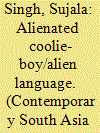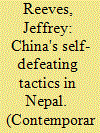| Srl | Item |
| 1 |
ID:
116054


|
|
|
|
|
| Publication |
2012.
|
| Summary/Abstract |
This article explores the ambiguity inherent in the relationship between social activism and politics in West Bengal. I use a detailed account of the career of singer-activist turned politician Kabir Suman to examine the activist's view of himself and of politics, as well of how the porous boundary between activism and politics is both blurred and crossable. The fact that activists possess a kind of political capital useful within the framework of a political party may facilitate their entry into electoral politics. Yet as this article demonstrates, the activist may sometimes only be able to retain his activist credentials by sacrificing his political career. In addition, this article seeks to conceptualise the social activist as a particular type of political figure. I do so by locating the study of Kabir Suman within an emerging body of literature on political leadership in India. I argue that while the case of Kabir Suman may not be paradigmatic, his 'activist' style of leadership challenges certain contemporary classifications of political leadership in India.
|
|
|
|
|
|
|
|
|
|
|
|
|
|
|
|
| 2 |
ID:
116058


|
|
|
|
|
| Publication |
2012.
|
| Summary/Abstract |
The primary focus of this essay is on the representation of child labour in Mulk Raj Anand's Coolie (1936). I argue that the young-ness of Munoo, the coolie-boy is significant for understanding Anand's social critique of the colonial-capitalist machinery and its reliance upon the sub-waged labour of children and adolescents. It is limiting to read the novel as merely a social critique, however, as it also opens up crucial debates on what it means for an Indian writer writing in English to represent a young ostracised citizen-subject who can hear English and mimic its sounds without having access to an English education. Anand's use of an adolescent is thus significant as an early attempt at foregrounding regional disenfranchisement in English. Through the tropes of listening, seeing, and smelling, and Anand's selective translations and transliterations, I show why Munoo's adolescence matters: it provides a social commentary as well as enabling Anand to highlight the conundrum of representing Munoo's semi-literate, non-English subjectivity into the English language.
|
|
|
|
|
|
|
|
|
|
|
|
|
|
|
|
| 3 |
ID:
116059


|
|
|
|
|
| Publication |
2012.
|
| Summary/Abstract |
China's use of coercion and its myopic focus on Tibetan issues in Nepal are undermining Nepalese public support for China's involvement in Nepal. If China desires continued, constructive contact with Nepal, it must alter its foreign policy approach accordingly. Yet all indications suggest that China will continue with its status quo policies toward Nepal in the near and medium term. This suggests that China's relations with Nepal will become more complicated in the future.
|
|
|
|
|
|
|
|
|
|
|
|
|
|
|
|
| 4 |
ID:
116056


|
|
|
|
|
| Publication |
2012.
|
| Summary/Abstract |
This article examines the case for Jammu and Kashmir's independence from India as a matter of remedial justice within the context of a moral right to secede premised upon the circumstances of the state's 1947 inclusion within the Indian union. Principles of remedial justice are defended as a suitable basis for adjudicating rival claims to sovereignty and negotiating secessionist disputes. The case for Kashmir's secession as a matter of remedial justice is then investigated with reference to the claims that India attempted to seize the former princely state by force and reneged on the promise of a plebiscite to ratify its sovereignty. This article argues that, while a contractual understanding of these claims might yield a coherent explication of a right to secede, this would not include a right to independent statehood and should be rejected because of the corollary that Dogra rule was morally legitimate. By contrast, the state's right to secede might be justified by reference to the claim that the events of accession violated its inhabitants' rights to popular sovereignty and self-determination. However, while offering a more plausible account of a right of secession, such a justification would not be a specifically remedial one and would fail to include many of the benefits of a remedial right. Consequently, we need to look beyond the historical events surrounding the state's accession as the basis for reconciling competing claims regarding Kashmir's rightful political status within a framework of remedial justice.
|
|
|
|
|
|
|
|
|
|
|
|
|
|
|
|
| 5 |
ID:
116057


|
|
|
|
|
| Publication |
2012.
|
| Summary/Abstract |
Exiting impact analysis studies on the Self Help Group-Bank Linkage Programme (SBLP) of the National Bank of Agriculture and Rural Development (NABARD) underline that the programme has done extremely well in rural India in terms of its outreach, generating income, reducing poverty levels and empowering people both economically and socially. This paper evaluates the impact of SBLP on Self Help Group (SHG) members at the household level from a gender perspective. The analysis of the study is based on a large sample of primary data covering 4791 SHG households and 900 SHGs collected from six states in India. Furthermore, the sample covers more than 60% of SHGs that consist of members belonging to below poverty line families. Overall, the performance analysis reveals that households whose member(s) belong to all-female SHGs perform better than households whose members belong to other types of SHGs. This is mainly because female SHGs are doing extremely well in terms of recovery of loans and per capita income and savings. A chunk of female SHG members in all the six sample states reported an improvement of their social empowerment after joining the SHG programme. Furthermore, the fall of poverty is more pronounced in cases of households whose members belong to female SHGs at 26.0 percentage points between pre-SHG period and post-SHG period. The policy implication is that the formation of female SHGs needs to be encouraged and all necessary services should be provided to them.
|
|
|
|
|
|
|
|
|
|
|
|
|
|
|
|
| 6 |
ID:
116055


|
|
|
|
|
| Publication |
2012.
|
| Summary/Abstract |
This paper reviews the recent situation in information and communication technology (ICT) development in Bangladesh, with particular reference to mobile phone technologies. While mass access to ICT is often portrayed as the great socio-economic leveller, we show that in the Bangladesh case the existing evidence illustrates something quite different. Despite the high profile of certain female politicians, Bangladesh performs very poorly on international measures of gender equality and the reasons are deeply rooted in social and cultural norms. As a consequence, programmes aimed at poverty alleviation through widespread deployment of ICT in rural areas are disproportionately beneficial to men, even when targeted primarily at women. We conclude that unless ICT programmes are more sensitive to the causes of gender inequity, the ICT revolution in Bangladesh is likely to deepen rather than ameliorate the gender divide.
|
|
|
|
|
|
|
|
|
|
|
|
|
|
|
|